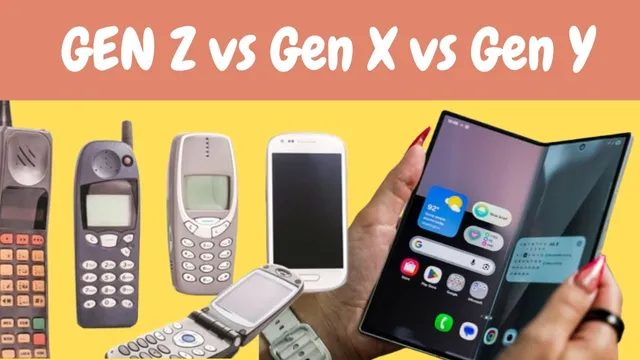- By Ajeet Kumar
- Thu, 21 Aug 2025 02:36 PM (IST)
- Source:JND
Gen Z vs Gen X vs Gen Y: Which generation faced the most significant technological changes during their formative years? From the shift from dial-up to high-speed internet, the emergence of smartphones, or the move from physical media to streaming, which age group had to adapt the most during a pivotal stage of life?
In recent months, Gen Z's workplace stunts have taken centre stage, sparking heated debates across social media. Yet, this online clash isn’t exclusive to Gen Z alone. There is a silent ongoing war between Gen Y (Millennials — individuals born roughly between the early 1980s and the mid-1990s) and Generation X (born 1965-1980) regarding the technological advancement they witnessed in their lifetime.
Which generation witnessed the most tech changes?
In a Reddit post, a user asked, “Which birth years experienced the most drastic technological changes during their formative years, significantly shaping their way of life?” The question turned into a heated debate where the last three generations claimed their victory.
A Reddit user, named crossedtherubicon20, said he was born in the late 80s, where he emphasized witnessing a major change in the computer system and social media platforms.
“Most of us grew up with one computer/one cell phone household, if that. We didn’t have our own cell phones until our late teens. Still call most of our friends’ house lines. Went to high school without social media (however, sites like hi5 were becoming popular by the time I graduated HS in 2005),” said the user.
Then in college, we saw in real time how social interactions moved online (often in spans of months - going from MySpace to Facebook within 4 years). I remember when radio ads started promoting Facebook promotions for their business. I thought that was crazy at the time. I feel like we were part of the last cohort to live most of their formative years in analog and finish it in digital,” it added.
Average CPU speed increased by 1000 times: Reddit user
While another user highlighted how the average processing power of a CPU has increased 1000 times. And, data storage has increased by almost a million times. Similarly, network bandwidth has increased by similar amounts.
“In 20 years, mobile phones have gone from voice calling with text messaging on low-resolution screens to high-resolution multicore CPU multimedia pocket PC's. There were no mass market phones with cameras until around 2005, and until 10 years ago, the cameras on phones were very low resolution. My current mobile phone costs the same amount (despite inflation) as the first camera phone I bought in 2005, and it can record and stream video in 4K. Direct streaming to the internet via mobile did not exist until 15 years ago,” read the post.
“I think anyone who was in school in the 90s, so pre-internet. We went from having to spend days just LOOKING for information. If your family had an encyclopedia set, you had the world at your fingertips. Librarians were key assets to helping you find information. Now, we just think of questions, and within an hour we could know more than someone who dedicated years to studying a topic,” said a user who was potentially born in the late 90s’.
Which generation is the winner?
The New York Post, a similar social media post, reported how users turned nostalgic during the heated debate. “We watched the world go from analog to digital in real-time,” an additional commenter wrote. “From burning CDs to streaming everything on demand. From landlines to smartphones that replaced 10 different devices.”
Some are even rewinding. “And I am now reversing it all. Going back to flip phone, CDs in the car, getting rid of social media and entertainment apps, and regulating my nervous system,” declared someone else.
Citing experts, NYP reported millennials might have the strongest case for the crown. “What’s unique about this generation’s relationship with technology is that they didn’t grow up with the expectation that every interaction would be mediated by a screen—and yet they have become deeply fluent in it. That fluency is both a bridge and a burden,” Elika Dadsetan, executive director of VISIONS, Inc., told Newsweek in a recent interview.

